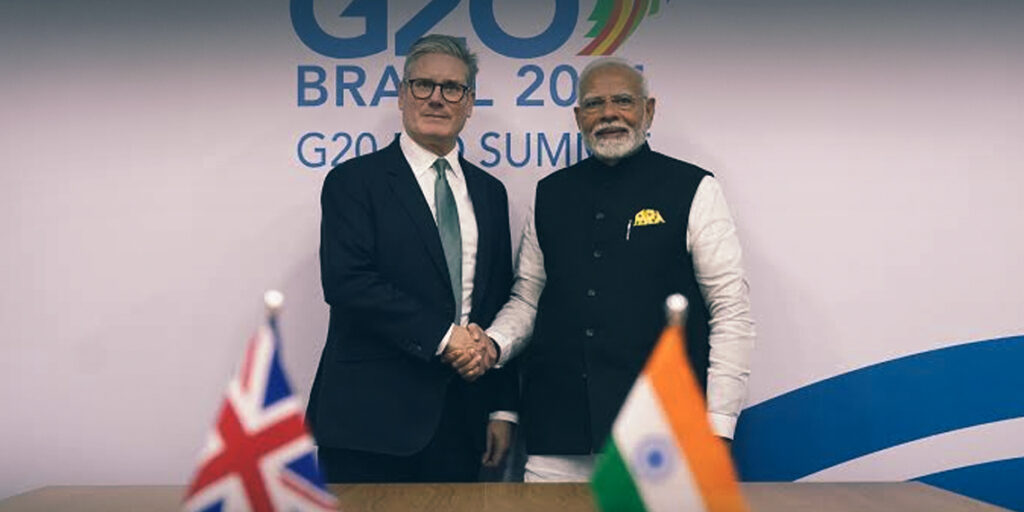The United Kingdom plans to relaunch trade negotiations with India at the start of 2025, with Sir Keir Starmer aiming to elevate Britain’s relationship with Delhi to “another level.” Sir Keir, following a meeting with Indian Prime Minister Narendra Modi at the G20 summit, expressed his ambition to forge a “new strategic partnership” with India, encompassing trade, energy, and security collaborations.
According to Downing Street, a deal between the world’s fifth and sixth largest economies could strengthen UK employment, with the trading relationship valued at £42 billion in the 12 months leading up to June 2024. As confirmed by officials, trade talks will recommence in early 2025. Sir Keir stated, “Boosting economic growth is crucial for improving living standards for working people. A new trade deal with India will create jobs and foster prosperity in the UK, marking a key milestone in our mission to deliver growth and opportunity across the nation.”
Negotiations between New Delhi and London had previously faced delays under the former government. Boris Johnson had aimed for a trade agreement to coincide with Diwali in October 2022. However, Rishi Sunak’s administration refrained from setting a deadline for the agreement’s completion.
The original goal of the talks, launched in January 2022, was to double trade between the UK and India to £86 billion by 2030. By 2028, India is projected to become the world’s third-largest economy and was the UK’s 11th largest trading partner in the last financial year, contributing 2.4% of total UK trade, according to government statistics.
Jonathan Reynolds, UK Business Secretary, described India as a “vital trading partner.” He emphasized the importance of lowering Indian tariffs to boost British exports and highlighted how investments already support over 600,000 jobs across both nations. Reynolds further noted, “Striking a deal is pivotal to fulfilling this government’s mission of driving economic growth.”
In July, Reynolds announced the UK’s intent to establish improved trade relations globally, including ongoing negotiations with Switzerland, South Korea, and the Gulf Cooperation Council. Addressing potential concerns about access to the UK labor market, Downing Street affirmed that all trade deals would be “rooted in the UK national interest” and upheld the existing stance on migration, prioritizing the reduction of net migration.
The Department for Business and Trade is preparing to release its new Trade Strategy, aligned with the Industrial Strategy, to guide future negotiations and promote sustainable and inclusive growth.
Earlier this year, the UK and India signed an agreement to enhance cooperation in artificial intelligence and emerging technologies. The initiative was agreed upon by national security advisers during a visit by Foreign Secretary David Lammy to India.
The trade announcement coincides with the second day of the G20 summit, where Sir Keir Starmer will engage with foreign leaders. During the summit, he held discussions with Chinese President Xi Jinping, emphasizing hopes for “respectful” relations and addressing the case of detained pro-democracy activist Jimmy Lai. Sir Keir proposed a comprehensive UK-China meeting either in London or Beijing to establish “consistent, durable, respectful” diplomatic ties.
However, Shadow Foreign Secretary Dame Priti Patel criticized the Prime Minister for not being “stronger” on human rights during his conversation with President Xi. The talks were followed by additional discussions with Australia and Japan, focusing on strengthening support for Ukraine as it approaches 1,000 days since Russia’s full-scale invasion.
While facing questions about the potential approval of Storm Shadow missiles for Ukraine, Sir Keir refrained from revealing “operational details,” emphasizing that doing so would only benefit Russia’s Vladimir Putin.


